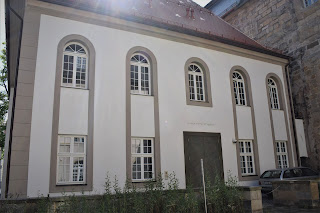With a community of around 500 people, the Jewish life in Bayreuth is aimed at getting a new impetus with the opening of a Jewish center the next year. Situated opposite the synagogue, considered the oldest still in use in Germany, the center will include a kosher café, rooms for Talmud Torah classes and other spaces for events.
It is unclear who will give the hechsher - the stamp attesting the products are kosher - or who will teach the Torah classes. Most of the community is nowadays made of Russian-speaking Jews originally from the former Soviet Union.
 |
| The synagogue |
The history of the local synagogue is connected for all this goods and bads with the UNESCO-listed Margravial Opera House. During the Kristallnacht pogrom, it was not put on fire only because it was a high probability that the Opera with which is sharing a common wall, will be affected. At the end of the war, when the Allies were throwing the remaining bombs on the way out of Germany, it was the round of the synagogue to save the Opera, which was not bombed in order to spare the synagogue.
 |
| The community center |
As everywhere in Germany, and in Europe in general, the life of Jews in Bayreuth was never been easy. The first proof of Jewish life is dating back in the 13th century. Various persecutions and pogroms ceased their presence between the 16th and 18th century. Under the protection of Magrave Friedrich, they were allowded to return. Their main representative at the time was Moses Seckel, the count banker and count supplier. The community grew up slowly, with 389 persons registered in 1792 and 530 in 1837. The intensive anti-Semitism, manifested both in the everyday life and at a highly intellectual level - see Wagner's works - reduced significantly the Jewish presence in Bayreuth. It continued to decrease constantly in the years of National-Socialism, with only 80 Jews living here in 1938. Most of them were killed during deporations, with only a couple of them surviving, mostly due to their marriage with Christian spouses.
Walking tours aimed to highlight the Jewish life are organised via the local tourism office, featuring former Jewish properties and streets with Jewish histories, as well as places of memories, where the Jews were gathered and sent to death.


